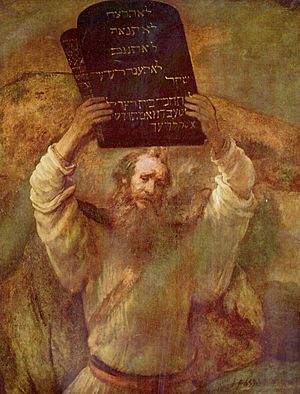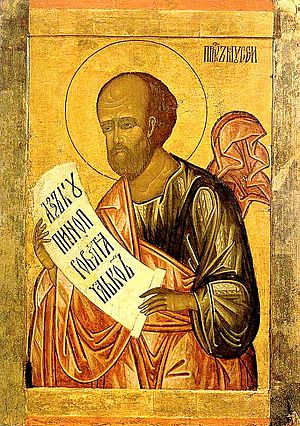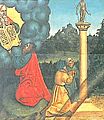Ten Commandments facts for kids
The Ten Commandments are a special set of ten rules or laws. Many people believe God gave these rules to the people of Israel a long, long time ago. You can find different versions of these commandments in the Bible. One version is in the Book of Exodus, and another is in the Book of Deuteronomy.
The Bible says these rules were given on a mountain, sometimes called Mount Sinai and sometimes Mount Horeb. Most people think these are just different names for the same mountain. The rules were written on stone tablets. These rules are very important for two major religions: Judaism and Christianity. Some of these ancient rules have even influenced the laws that countries follow today!
Sometimes, the Ten Commandments are also called the Decalogue. This word comes from Greek and means "ten statements." The Israelites received these commandments after they left Egypt, a big event led by Pharaoh Thutmose. The Qur'an, the holy book of Islam, also mentions these tablets, but it doesn't list the exact same commandments. For example, the Qur'an emphasizes worshipping God alone and honoring your parents.

Contents
What Are the Ten Commandments?
The Ten Commandments are a guide for how people should live and treat each other. Here they are in a simple list:
- Do not have any other god before God.
- Do not make yourself an idol (a statue or picture to worship).
- Do not use God's name in a disrespectful way.
- Always honor your father and your mother.
- Keep the Sabbath day holy (a special day of rest and worship).
- Do not murder (take someone's life).
- Do not commit adultery (be unfaithful in marriage).
- Do not steal (take what isn't yours).
- Do not lie or give false information about your neighbor.
- Do not covet (strongly desire) what belongs to someone else.
The Ten Commandments in the Bible
The Bible explains each of these commandments in more detail. Here's a quick look at what they mean:
- Only One God: The Bible says God is the one who freed the Israelites from Egypt, and they should worship only Him.
- No Idols: People should not make statues or pictures of anything in heaven, on earth, or in the water to worship them. God wants all the honor for Himself.
- Respect God's Name: You should not use God's name carelessly or for bad reasons. It should always be treated with respect.
- Keep the Sabbath Holy: For six days, people can work, but the seventh day is a special day of rest for God. Everyone, including family and servants, should rest on this day.
- Honor Your Parents: It's important to respect and honor your father and mother. Doing so is believed to lead to a long life.
- Do Not Murder: You should not take another person's life without a good reason.
- Be Faithful in Marriage: People should be loyal and true in their marriage relationships.
- Do Not Steal: You should not take things that belong to other people.
- Do Not Lie: You should not give false information or tell lies about your neighbor.
- Do Not Covet: You should not strongly desire or wish for your neighbor's house, their spouse, their servants, or anything else that belongs to them.
The Ten Commandments in Islam
Islam teaches that the Bible is a message from God, but Muslims believe that parts of the text used by Jews and Christians have changed over time. The Ten Commandments are not listed exactly in the Qur'an, but many of the same ideas are found there.
- One God: The Qur'an teaches that there is no god except God (Allah).
- No Idols: It encourages people to protect themselves and their children from worshipping idols.
- Respect God's Name: Muslims are told not to use God's name in casual swearing or to gain trust from others.
- Prayer and Business: When it's time for the special Friday prayer, Muslims should stop their business and remember God.
- Honor Parents: The Qur'an says to honor your parents and never show them annoyance or shout at them. Treat them kindly.
- Do Not Murder: Killing an innocent person is seen as if you have murdered all people.
- Do Not Commit Adultery: This is described as a very serious sin and bad behavior.
- Do Not Steal: Stealing is a crime that has a punishment, serving as an example from God.
- Do Not Hide Testimony: You should not hide what you have seen or heard when giving a testimony, as hiding it is a sin.
- Do Not Covet: People should not wish for what God has given to others, as these are temporary things in life.
Other Religions and Similar Rules
While Judaism, Christianity, and Islam are the main religions that recognize the Ten Commandments, many other religions have similar rules or principles. For example, Buddhism, Hinduism, and Jainism all have ethical guidelines that encourage good behavior.
For instance, the Buddhist Five Precepts are similar to some of the Ten Commandments:
- Abstain from hurting and killing both humans and animals (like "Do not murder").
- Abstain from taking what is not given (like "Do not steal").
- Abstain from bad speech, such as telling lies or using hurtful words (like "Do not bear false witness").
- Abstain from intoxicating drugs and drinks that lead to carelessness.
The Ritual Decalogue
The "Ten Commandments" usually refers to the list in Exodus 20 and Deuteronomy 5. However, there's another set of commandments mentioned in the Bible, specifically in Exodus 34. This version is sometimes called the "Ritual Decalogue" because it focuses more on religious practices and rituals.
Some scholars believe that the commandments in Exodus 34 might have been the original Ten Commandments, and the ones we know best (the "Ethical Decalogue") came later. This shows how religious texts can develop and change over a long time, with different stories and traditions being included.
Influence of the Commandments
The Ten Commandments have had a huge impact on how people think about right and wrong, especially in Jewish and Christian cultures. They have shaped ethics (moral principles) and law in Western societies since the time of the Roman Empire. Many ideas about fair laws and how governments should work, like having independent judges, can be linked back to the principles found in these ancient rules.
The Ten Commandments in Movies
The story of the Ten Commandments has been told in famous movies! There have been two well-known films with this name, both directed by Cecil B. DeMille.
- A silent movie was made in 1923.
- A more famous movie came out in 1956, starring Charlton Heston as Moses. This movie was a huge success and earned the most money that year!
Images for kids
-
This 1768 parchment copy of the Ten Commandments was made by Jekuthiel Sofer, a scribe in Amsterdam.
-
The Sixth Commandment, as translated by the Book of Common Prayer (1549), from the altar screen of the Temple Church in London.
-
A Ten Commandments display at the Texas State Capitol in Austin.
-
A detail from The Ten Commandments painting by Lucas Cranach the Elder in Wittenberg.
See also
 In Spanish: Diez Mandamientos para niños
In Spanish: Diez Mandamientos para niños







